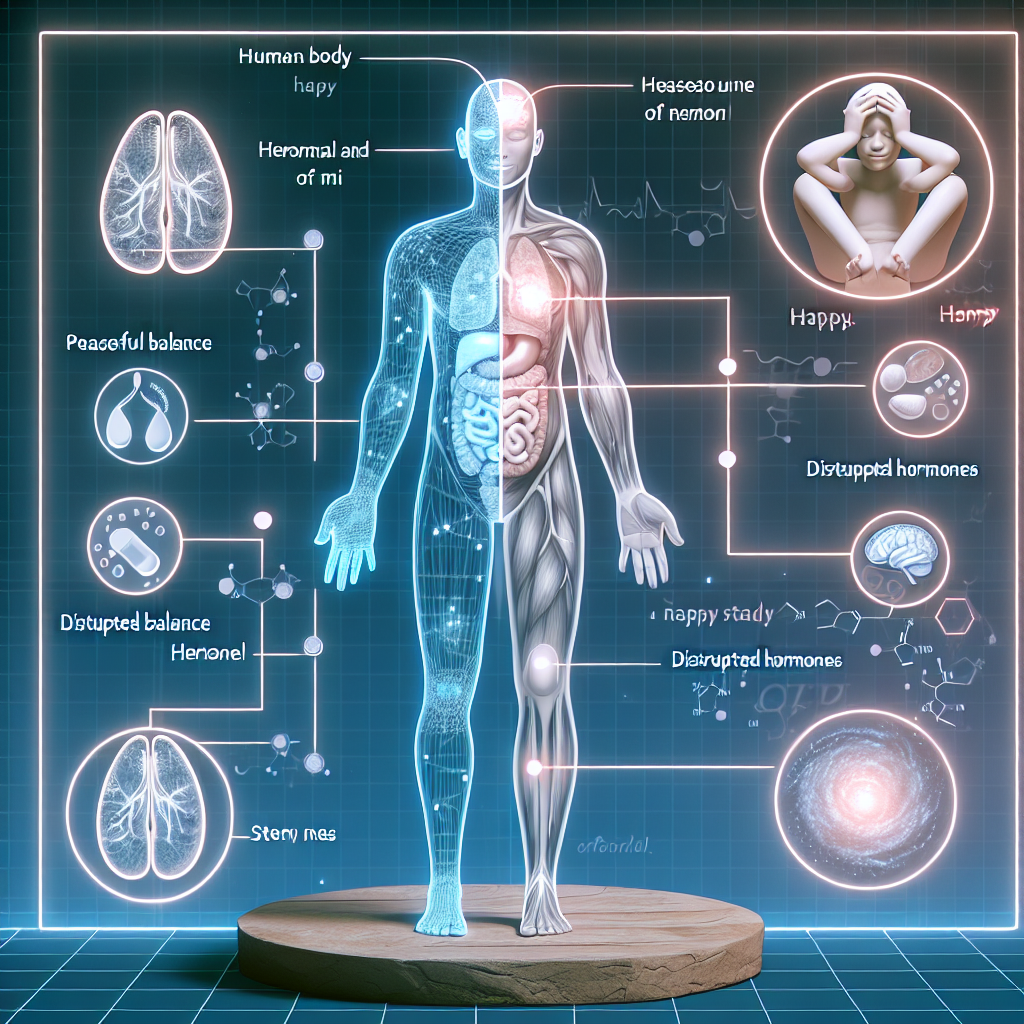How Stress Affects Your Hormonal Balance

Discover how stress affects your hormonal balance and learn ways to manage it effectively. Visit www.myvibrantvitality.com for more information.
Understanding the Impact of Stress on Your Hormonal Balance
Stress is an inevitable part of life. It is a natural response to the challenges and demands we face daily. However, chronic stress can have a profound impact on our health, particularly on our hormonal balance. Understanding the impact of stress on your hormonal balance is crucial to maintaining overall health and well-being.
The human body is a complex system of interconnected parts, and hormones play a vital role in regulating many of these parts. They act as chemical messengers, traveling through the bloodstream to tissues and organs, influencing a wide range of physiological functions, from metabolism and immune function to mood and behavior. When the body is under stress, it responds by releasing stress hormones, primarily cortisol and adrenaline, to help cope with the situation.
Cortisol, often referred to as the “stress hormone,” is produced by the adrenal glands in response to stress. It plays a crucial role in the body’s fight-or-flight response, preparing the body for action by increasing heart rate, blood pressure, and glucose levels. However, when stress becomes chronic, the constant high levels of cortisol can lead to a hormonal imbalance, disrupting the normal functioning of other hormones in the body.
Adrenaline, another stress hormone, works in tandem with cortisol. It is responsible for the immediate reactions we feel when stressed, such as a rapid heartbeat and increased alertness. Like cortisol, prolonged exposure to adrenaline due to chronic stress can disrupt the hormonal balance, leading to various health issues.
Chronic stress can also affect other hormones in the body. For instance, it can disrupt the balance of insulin, a hormone that regulates blood sugar levels. High levels of stress can lead to increased insulin production, which can result in weight gain, increased hunger, and even type 2 diabetes. Stress can also affect the reproductive hormones, leading to irregular menstrual cycles in women and decreased testosterone levels in men.
Moreover, stress can interfere with the production of serotonin and dopamine, hormones that regulate mood, sleep, and appetite. Chronic stress can lead to decreased levels of these hormones, resulting in symptoms of depression, anxiety, insomnia, and changes in appetite.
Understanding the impact of stress on your hormonal balance is the first step towards managing it effectively. It is essential to recognize the signs of chronic stress and take steps to reduce it. Regular exercise, a balanced diet, adequate sleep, and relaxation techniques such as meditation and yoga can help maintain a healthy hormonal balance. It is also important to seek professional help if stress becomes overwhelming.
In conclusion, stress has a significant impact on our hormonal balance. While a certain level of stress is normal and even beneficial, chronic stress can lead to hormonal imbalances that can affect various aspects of our health. Therefore, managing stress effectively and maintaining a healthy lifestyle are crucial for preserving hormonal balance and overall well-being.
The Connection Between Stress and Hormonal Imbalance: What You Need to Know

Stress is an inevitable part of life. Whether it’s due to work, relationships, or other life events, we all experience stress at some point. However, chronic stress can have a significant impact on our health, particularly on our hormonal balance. Understanding the connection between stress and hormonal imbalance is crucial for maintaining optimal health and well-being.
The human body is a complex system that relies on a delicate balance of hormones to function properly. These hormones, which are produced by various glands in the body, regulate a wide range of physiological processes, including metabolism, growth and development, mood, sleep, and reproduction. When this balance is disrupted, it can lead to a variety of health problems, ranging from minor issues like fatigue and weight gain to serious conditions like diabetes and heart disease.
Stress plays a significant role in disrupting this hormonal balance. When we experience stress, our bodies respond by releasing stress hormones, including cortisol and adrenaline. These hormones are designed to help us cope with immediate threats or challenges, triggering the so-called “fight or flight” response. However, when stress becomes chronic, the constant release of these hormones can lead to hormonal imbalance.
Cortisol, often referred to as the “stress hormone,” is particularly influential in this regard. Under normal circumstances, cortisol levels fluctuate throughout the day, peaking in the morning and gradually declining as the day progresses. However, chronic stress can disrupt this natural rhythm, leading to consistently high levels of cortisol. This can have a variety of negative effects on the body, including increased blood sugar levels, weight gain, insomnia, and a weakened immune system.
Moreover, chronic stress can also affect other hormones in the body. For instance, it can disrupt the balance of sex hormones, such as estrogen and testosterone, leading to problems like menstrual irregularities, reduced libido, and fertility issues. It can also affect the production of thyroid hormones, which regulate metabolism, potentially leading to symptoms like fatigue, weight gain, and depression.
The good news is that there are several strategies that can help manage stress and, in turn, support hormonal balance. Regular physical activity, for example, can help reduce cortisol levels and boost the production of endorphins, the body’s natural mood elevators. A balanced diet rich in fruits, vegetables, lean proteins, and whole grains can also support hormonal health by providing the nutrients needed for hormone production.
In addition, practices like mindfulness, meditation, and yoga can help reduce stress and promote a sense of calm and well-being. These practices can help lower cortisol levels and support the balance of other hormones. Finally, getting enough sleep is crucial for hormonal balance, as many hormones follow a circadian rhythm and are regulated by sleep-wake cycles.
In conclusion, stress can have a significant impact on hormonal balance, leading to a variety of health problems. However, by understanding this connection and taking steps to manage stress, it’s possible to support hormonal health and overall well-being. Whether it’s through regular exercise, a balanced diet, mindfulness practices, or adequate sleep, there are many ways to combat the negative effects of stress and promote hormonal balance.
How Chronic Stress Can Disrupt Your Hormonal Equilibrium
Stress is an inevitable part of life. It is a natural response to the challenges and demands we face daily. However, when stress becomes chronic, it can have a profound impact on our health, particularly on our hormonal balance. The intricate relationship between stress and hormones is a complex one, and understanding it can provide valuable insights into managing stress and maintaining hormonal equilibrium.
The human body is a marvel of biological engineering, with hormones serving as the chemical messengers that regulate virtually every physiological process. From metabolism and immune function to mood and sexual health, hormones play a crucial role. However, chronic stress can disrupt this delicate hormonal balance, leading to a cascade of health issues.
When we encounter a stressful situation, our body responds by releasing stress hormones, primarily cortisol and adrenaline. These hormones prepare our body for the ‘fight or flight’ response by increasing heart rate, blood pressure, and glucose levels. This response is beneficial in short-term, acute stress situations. However, when stress becomes chronic, the constant release of these hormones can lead to hormonal imbalance.
Cortisol, often referred to as the ‘stress hormone,’ is particularly affected by chronic stress. Under normal circumstances, cortisol levels follow a diurnal rhythm, peaking in the morning and gradually declining throughout the day. However, chronic stress can disrupt this rhythm, leading to elevated cortisol levels throughout the day. This can have a range of negative effects, including weight gain, sleep disturbances, and a weakened immune system.
Moreover, chronic stress can also disrupt the balance of other hormones. For instance, it can lead to an overproduction of adrenaline, which can result in anxiety, heart palpitations, and high blood pressure. Chronic stress can also affect the production of sex hormones, leading to issues such as reduced libido, menstrual irregularities in women, and erectile dysfunction in men.
Furthermore, the relationship between stress and hormones is bidirectional. Just as chronic stress can disrupt hormonal balance, hormonal imbalances can also exacerbate stress. For example, an imbalance in thyroid hormones can lead to symptoms such as fatigue, weight gain, and depression, which can further increase stress levels.
The good news is that there are several strategies to manage stress and maintain hormonal balance. Regular physical activity, a balanced diet, adequate sleep, and mindfulness practices such as meditation and yoga can all help to reduce stress levels and restore hormonal equilibrium. Additionally, seeking professional help from a healthcare provider or a mental health professional can be beneficial, particularly for individuals dealing with chronic stress.
In conclusion, chronic stress can have a profound impact on our hormonal balance, disrupting the delicate equilibrium that regulates our body’s functions. Understanding the relationship between stress and hormones is crucial for managing stress and maintaining health. By adopting stress management strategies and seeking professional help when necessary, we can help to restore our hormonal balance and safeguard our health.